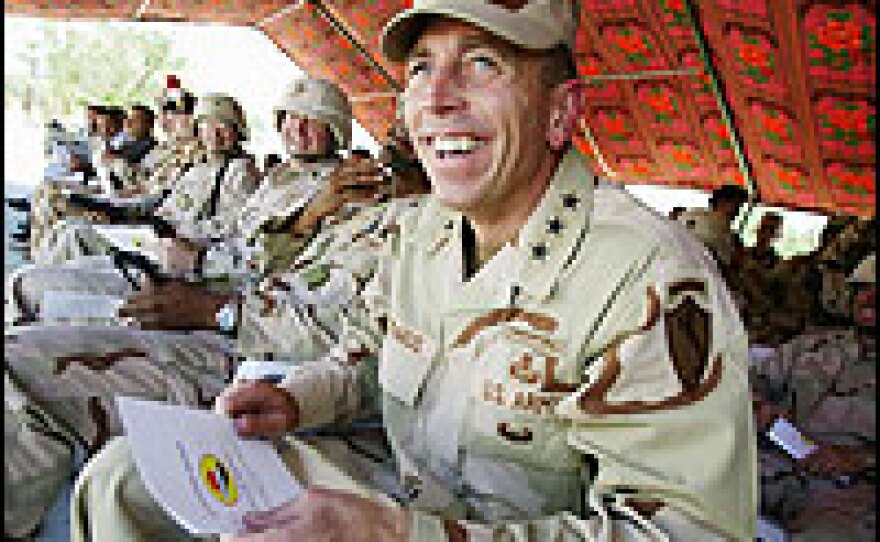Lt. Gen. David Petraeus is soon expected to take over command of all U.S. forces in Iraq. If he is confirmed by the Senate, this will be his third tour of duty in the country. He commanded the 101st Airborne during the invasion in 2003 and oversaw the northern part of the country immediately after the invasion. He returned to Iraq in 2004 to oversee the training of Iraqi security forces.
The son of a Dutch sea captain, Petraeus began his military career at West Point. And he is no ordinary general. He has a Ph.D. in history from Princeton. His thesis topic: The American Military and the Lessons of Vietnam.
He also recently coauthored an Army manual on counterinsurgency operations. Petraeus and other officers say the Army collectively forgot how to fight an insurgency after Vietnam.
As major combat operations began to end in April 2003, writer Rick Atkinson was trailing the 101st Airborne through the wide-open deserts and teeming cities of Iraq. He says he and Petraeus had a running joke.
"Tell me how it ends," Petraeus would say. Atkinson says it was said tongue-in-cheek, but also with an understanding that it was the pertinent question.
Once Baghdad fell, the 101st was dispatched to Mosul in northern Iraq, where Petraeus won praise for his work. He provided security, listened to tribal and religious leaders and focused on the economy, reopening factories and businesses.
In October 2003, Petraeus described the effort this way: "This is a race. This is a race to win the hearts and minds of the Iraqi people. And there are other people in this race. And they're not just trying to beat us to the finish line. In some cases, they want to kill us."
Retired Army Gen. Jack Keane, a close friend, says Petraeus understands how to work with a local population and encourage them to break with insurgents. That's the essence of what the military calls counterinsurgency. He says Petraeus is the perfect choice for the job.
During a training exercise, Keane recalls, an accidental rifle shot hit Petraeus in the chest. Keane held his hand as he was flown to a nearby hospital. A surgeon named Bill Frist, who would later become Senate Majority Leader, was pulled off a golf course to treat him.
A few days after surgery, Petraeus demanded to be released. A doctor told him that it was impossible to release him so soon after major surgery. According to Kaine, Petraeus told the doctor to take out the tubes and then got down on the floor and did 50 pushups. The hospital sent him home.
Petraeus's almost fanatical devotion to physical fitness is legendary. He often challenges men less than half his age to contests. One story is that a young special forces soldier asked him how many push-ups he could do. "One more than you," replied Petraeus, who immediately proved it.
When he was commanding the 101st in Mosul, Petraeus became known as a man who could get things done, often bending the rules to accomplish his goals.
But Petraeus has also rubbed some fellow officers the wrong way. One former aides described him as the most competitive man on Earth, according to writer Rick Atkinson. He does not suffer fools gladly. He also has had a long history of cultivating high-ranking generals, which led some peers to label him a "professional son."
His intellect, ego and ambition also earned him a less charitable nickname: "King David."
Some say Petraeus was lucky to be stationed in northern Iraq. The violence and ethnic tensions were not as pronounced as in Baghdad or the more turbulent Anbar Province.
Petraeus is credited with doing a better job than his predecessor of training Iraqi soldiers and police in 2004 and 2005. But the Iraqis still cannot secure their own country, and corruption remains endemic. Sectarian militias have penetrated many security forces. And large numbers of Iraqi police and soldiers simply don't show up for duty.
Atkinson says Petraeus began training Iraqis when he was full of optimism and most likely would concede that they aren't where he hoped they would be at this point. But, Atkinson points out, training the Iraqi security forces is the hardest job in the world. Except for the one Petraeus is about to take on.
In a 2003 interview with NPR, Petraeus seemed to be aware that the road ahead would not be easy.
"There are many here who regard us still as liberators," he told NPR's Deborah Amos in Mosul. "But there are also some that say, jeez, when are these guys going to leave? And inevitably, over time, even the best of liberators will become seen as occupiers."
Now it is Petraeus who is in charge — at a time when it is likely that even more American soldiers will be dispatched to Iraq. And there is still no sense of when they might be able to leave.
Copyright 2023 NPR. To see more, visit https://www.npr.org. 9(MDM3NjYwMjA5MDE1MjA1MzQ1NDk1N2ZmZQ004))



